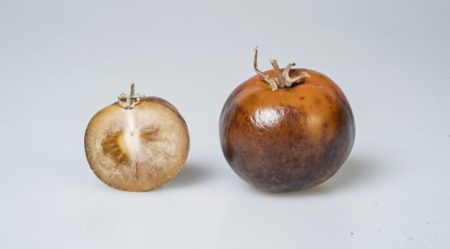Camel urine, vortex rings, gardening for L-DOPA, and more
10 Dec 2020
Posted by Andrew Kantor
Vaccine allergy warning
If you have severe allergies, Britain’s National Health Service warns: Don’t get the Pfizer/BioNTech Covid-19 vaccine. “Two people with a history of significant allergic reactions responded adversely yesterday,” when the vaccine was first given in the UK.
Shields up!
“Your pitiful face shields are no match for our sneeze vortex rings.”
“The vortex rings generated by the sneeze capture the microscopic droplets within the sneeze and transport them to the top and bottom edges of the face shield.” […] droplets travel to the face shield wearer quickly — within 0.5 to 1 second after the start of the sneeze.
Garden-variety L-DOPA
Scientists at the UK’s John Innes Centre have created a genetically modified tomato that produces the Parkinson’s drug L-DOPA.
The research team inserted a gene encoding a tyrosinase, an enzyme that uses tyrosine to build molecules such as L-DOPA . This elevated the level of L-DOPA specifically in the fruit part of the plant and led to higher yields than those associated with L-DOPA production in the whole plant.
This is cool for several reasons. First — it’s just cool. Second, the L-DOPA produced in the tomatoes doesn’t give people any adverse reactions, the way the chemically synthesized version can. Third, it could mean an affordable way to get the meds to developing nations.

At least you don’t have to eat them
Permanent damage
If you have a mouse that’s survived Covid-19, UCLA researchers have the details of why you should worry about it.
[T]he scientists discovered that the SARS-CoV-2 virus can shut down energy production in cells of the heart, kidneys, spleen and other organs. […] the study also revealed that some changes were long-lasting throughout the organs in mice with COVID-19. In addition to temporarily altering which genes were turned on and off in some cells, the virus made epigenetic changes — chemical alterations to the structure of DNA that cause more lasting effects.
Ace of bases: Making alkenes safer
Making drugs requires a bunch of precursor molecules (“Duh,” you say.) Alkenes* are one of the more important kind, but making them hasn’t changed much since the early 20th century. It requires some pretty harsh chemicals.
But wait! Rice University researchers found that a bacteria living near oceanic vents produces an enzyme called carH — and carH makes an alkene using vitamin B12, cobalt, and light. “Instead of needing heat and strong bases, it only needs light energy.”
Taking that cue…
The Rice team used B12 and the cobalt it contains with sodium bicarbonate (aka baking soda) as a mild base to make the olefins under blue light at room temperature.
Not only could this make drug manufacture easier, it could also allow for new olefin-based plastics.
* Also called olefins to keep footnote writers busy
Today’s debate topic
How do you handle the legacy of a medication that was tested unethically? When it comes to Retin-A (tretinoin), it’s still a touchy issue.
“[Albert] Kligman was indisputably a giant in dermatology. Underneath those achievements lies a troubling history of human experimentation and direct harm to vulnerable and marginalized people.”
Well this seems awfully obvious
An easy way to do a home Covid-19 test: See if you can smell the roses. Or the coffee. Or the unwashed teen.
“[S]mell checks can catch COVID-19 cases in people with no other symptoms,” Penn State scientists say. The university is even using a “Stop. Smell. Be well.” campaign on campus.

Surely you’re joking
Camel urine vs Covid?
No, camel urine doesn’t help. Neither do black pepper, garlic, ginger and lemon, nicotine patches, or pneumonia vaccines.
And yet that’s what people were trying, according to a pharmacy professor at Massachusetts College of Pharmacy and Health Sciences .
They also included herbal remedies like CBD and turmeric; nonmedicinal chemicals like chlorine bleach (inhaled), ethanol (drank), nasal saline rinses, baby shampoo and toothpaste; and procedures such as heat and sunlight exposure, cold exposure and hot baths.
Today’s amusing medical-not-pharma story
Not quite ready for their close-up: “Plastic surgeons say business is up, partly because clients don’t like how they look on Zoom“.


